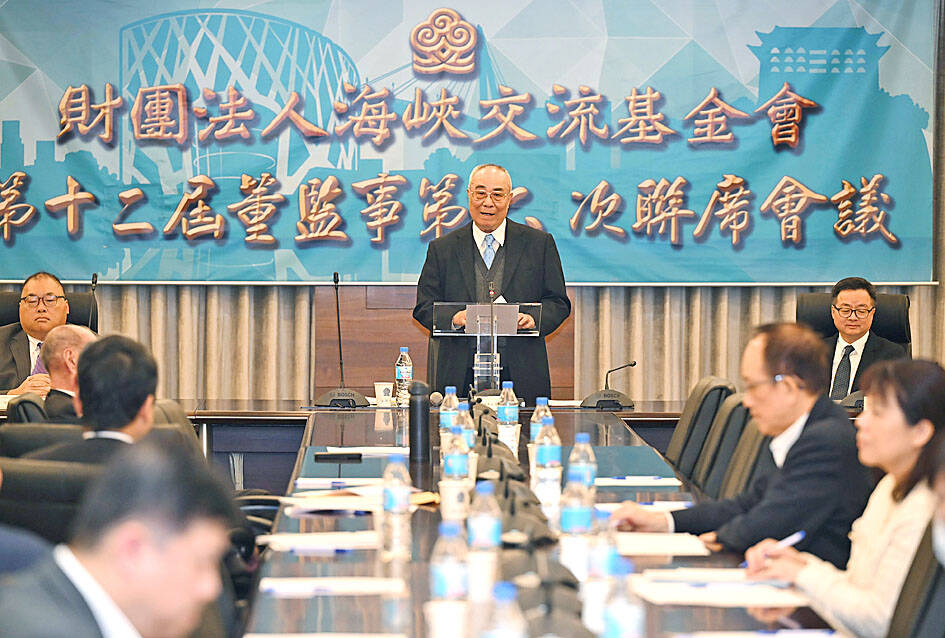The Chinese Communist Party (CCP) does not interact with the ruling Democratic Progressive Party (DPP), preferring instead to go through opposition parties and local governments, Straits Exchange Foundation (SEF) Chairman Frank Wu (吳豊山) told the foundation’s board yesterday.
Wu in his address said that efforts are still ongoing to promote cross-strait peace and to communicate with the foundation’s Chinese counterpart, the Association for Relations Across the Taiwan Straits.
Dialogue with the association has been suspended since 2016, when Tsai Ing-wen (蔡英文) won the presidential election, with Beijing saying that Tsai did not complete a test paper on the so-called “1992 consensus,” Wu said.

Photo: Chang Chia-ming, Taipei Times
“President William Lai (賴清德) in his inaugural address on May 20 last year stated that the Republic of China (ROC) Taiwan and People’s Republic of China are not subordinate to each other. The Chinese side interpreted it as promoting the concept of ‘Taiwan and China as two countries,’ which they would not accept,” Wu said.
The “1992 consensus” — a term that former Mainland Affairs Council chairman Su Chi (蘇起) in 2006 admitted making up in 2000 — refers to a tacit understanding between the Chinese Nationalist Party (KMT) and Chinese leaders that both sides of the Taiwan Strait acknowledge that there is “one China,” with each side having its own interpretation of what “China” means.
Wu took helm of the SEF in November last year, saying at the time that leaders on both sides advocate for peaceful engagement.
China’s Taiwan Affairs Office (TAO) in response said that dialogue could only resume based on the “1992 consensus.”
“I replied that if some sort of ‘consensus’ was agreed upon in 1992, then this agreement still must have a place for the ROC... So the Chinese side must state clearly, that in their interpretation of the ‘1992 consensus,’ where is the ROC?” Wu said.
In November last year, a TAO spokesperson explained it as “finding common ground among differences and setting aside disputes,” but Wu said that in the more-than-700-word explanation, not one word explained the ROC’s position.
The Taiwanese government does not want to quarrel about the “1992 consensus,” Wu said.
“We are only now talking about this issue to show that the Chinese side is using the ‘1992 consensus’ as a ludicrous pretext for not restarting dialogue,” he said. “Since the Chinese side could not explain the ROC’s position under the consensus, that clearly should be end of the dispute.”
“Lai’s address at his inauguration clearly stressed that he wishes for Taiwan and China to start dialogue instead of confrontation,” he said. “Therefore, it is the SEF’s aim to follow Lai’s directives.”
However, Beijing has deliberately chosen to only cooperate with opposition parties and local governments, he said, adding that “this is not open and upfront conduct as a self-proclaimed ‘great nation’ would do.”
The cross-strait situation also involves interaction between the US and China, Wu added.
“The US, China and other nations all know that peace is the only way for a bright future,” he said. “So I am willing to take a cautious, but optimistic stance on developing new cross-strait relations.”

The High Prosecutors’ Office yesterday withdrew an appeal against the acquittal of a former bank manager 22 years after his death, marking Taiwan’s first instance of prosecutors rendering posthumous justice to a wrongfully convicted defendant. Chu Ching-en (諸慶恩) — formerly a manager at the Taipei branch of BNP Paribas — was in 1999 accused by Weng Mao-chung (翁茂鍾), then-president of Chia Her Industrial Co, of forging a request for a fixed deposit of US$10 million by I-Hwa Industrial Co, a subsidiary of Chia Her, which was used as collateral. Chu was ruled not guilty in the first trial, but was found guilty

DEADLOCK: As the commission is unable to forum a quorum to review license renewal applications, the channel operators are not at fault and can air past their license date The National Communications Commission (NCC) yesterday said that the Public Television Service (PTS) and 36 other television and radio broadcasters could continue airing, despite the commission’s inability to meet a quorum to review their license renewal applications. The licenses of PTS and the other channels are set to expire between this month and June. The National Communications Commission Organization Act (國家通訊傳播委員會組織法) stipulates that the commission must meet the mandated quorum of four to hold a valid meeting. The seven-member commission currently has only three commissioners. “We have informed the channel operators of the progress we have made in reviewing their license renewal applications, and

Taiwan People’s Party (TPP) Chairman Huang Kuo-chang (黃國昌) yesterday appealed to the authorities to release former Taipei mayor Ko Wen-je (柯文哲) from pretrial detention amid conflicting reports about his health. The TPP at a news conference on Thursday said that Ko should be released to a hospital for treatment, adding that he has blood in his urine and had spells of pain and nausea followed by vomiting over the past three months. Hsieh Yen-yau (謝炎堯), a retired professor of internal medicine and Ko’s former teacher, said that Ko’s symptoms aligned with gallstones, kidney inflammation and potentially dangerous heart conditions. Ko, charged with

Taiwan-based publisher Li Yanhe (李延賀) has been sentenced to three years in prison, fined 50,000 yuan (US$6,890) in personal assets and deprived political rights for one year for “inciting secession” in China, China's Taiwan Affairs Office spokesman Chen Binhua (陳斌華) said today. The Shanghai First Intermediate People’s Court announced the verdict on Feb. 17, Chen said. The trial was conducted lawfully, and in an open and fair manner, he said, adding that the verdict has since come into legal effect. The defendant reportedly admitted guilt and would appeal within the statutory appeal period, he said, adding that the defendant and his family have